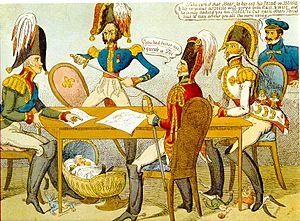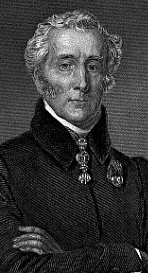Congress of Verona facts for kids
The Congress of Verona was a big meeting held in Verona, Italy, on October 20, 1822. It was part of a series of important international conferences that started after the Napoleonic Wars ended in 1815. These meetings aimed to keep peace in Europe and were part of a system called the Concert of Europe.
Contents
Who Was There?
The main countries involved were part of a group called the Quintuple Alliance. This was a powerful alliance of five major European nations. Here are some of the important people who attended:
 Russia: Emperor Alexander I and his foreign minister, Count Karl Robert Nesselrode.
Russia: Emperor Alexander I and his foreign minister, Count Karl Robert Nesselrode. Austria: Prince Metternich, a very influential statesman.
Austria: Prince Metternich, a very influential statesman. Prussia: Prince Hardenberg and Count Christian Gunther von Bernstorff.
Prussia: Prince Hardenberg and Count Christian Gunther von Bernstorff. France: The duc de Montmorency-Laval (foreign minister) and François-René de Chateaubriand.
France: The duc de Montmorency-Laval (foreign minister) and François-René de Chateaubriand.- United Kingdom: The Duke of Wellington, a famous military leader, represented Great Britain.
What Were the Main Issues?
At first, the European powers worked together closely after the Napoleonic Wars. But by 1822, their unity, known as the "Concert of Europe," was starting to weaken. Three main topics were discussed at the Congress of Verona:
The Italian Question
This issue was about Austria's continued control over parts of Northern Italy. Great Britain didn't want to support this control. So, the Duke of Wellington waited until the other powers had discussed this matter before formally joining the talks. Britain's role was mainly to observe and make sure nothing went against existing treaties.
The Greek Question
This was about the Greeks fighting for their independence from the Ottoman Empire. Great Britain's representative, the Duke of Wellington, was told to suggest that the Greeks should be recognized as having rights in the conflict. If other countries decided to get involved, Britain was instructed to only play a supporting role. The leaders of Russia and Austria had already discussed and settled their views on this issue before the main Congress began.
The Spanish Question
The most important discussion at Verona was about whether France should send its army into Spain. Spain was facing internal problems, and France wanted to help the Spanish king, Ferdinand VII of Spain, regain full power. Great Britain was strongly against any intervention in Spain.
France's representative, Montmorency, asked the other powers three main questions:
- Would they remove their ambassadors from Madrid if France had to?
- If there was a war, how would they support France morally?
- What physical help would they give France if asked?
The Russian Emperor Alexander I offered to send 150,000 Russian soldiers through Germany to help. However, this idea didn't appeal to Austria, France, or Great Britain.
The Duke of Wellington, representing Britain, stuck to the idea that countries should not interfere in the internal affairs of other nations. He refused to support any common statement or action against Spain.
In the end, Russia, Austria, and Prussia agreed to support France. They said they would withdraw their ambassadors and provide help if needed. But Great Britain, through the Duke of Wellington, refused to answer any of the questions. Britain stated it didn't know enough about the conflict and couldn't make a judgment.
This disagreement showed a clear break between Great Britain and the other major European powers. France did send its army into Spain, which led to the Battle of Trocadero. This battle helped King Ferdinand VII regain his power and started a period of strict rule in Spain and Europe. This period eventually led to more revolutions across Europe in 1848.
See also
 In Spanish: Congreso de Verona para niños
In Spanish: Congreso de Verona para niños
Images for kids
 | Anna J. Cooper |
 | Mary McLeod Bethune |
 | Lillie Mae Bradford |




